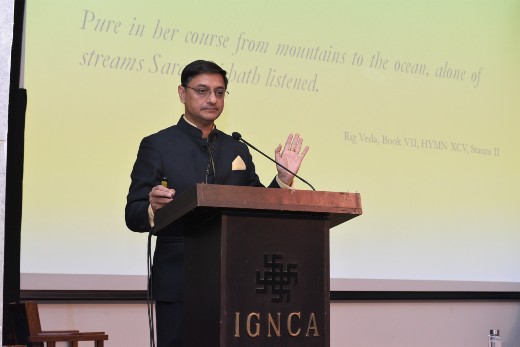“The idea of Bharat is ancient but not static”. Dr. Sanjeev Sanyal
New Delhi : “It is a misconception that India was named after Bharata, the son of King Dushyanta and Shakuntala. The name Bharat is even more ancient than this. India’s identity as a civilizational nation is very old. Dr. Sanjeev Sanyal, a renowned writer and Member of the Prime Minister’s Economic Advisory Council, said this at the Padma Vibhushan Dr. Kapila Vatsyayan Memorial Lecture organized by the Indira Gandhi National Centre for the Arts . The topic of the lecture was- “Bharatvarsha: A History of our Civilizational Identity”. It would be noteworthy that Dr. Kapila Vatsyayan was the founder Member Secretary of Indira Gandhi National Centre for the Arts.
In the beginning of the event, Professor Ramesh Chandra Gaur, Head of the Department of Kalanidhi Division of IGNCA gave the introduction of the topic and introduced the chief speaker, Dr. Sanjeev Sanyal. The lecture was presided over by Dr. Sachidanand Joshi, Member Secretary of Indira Gandhi National Centre for the Arts. In his scholarly lecture, Dr. Sanjeev Sanyal told the story of the naming of India and the development of this civilization on the basis of facts present in Vedic and Puranic texts. Dr. Sanyal said that the relationship between India and Sarasvati river is very important. Saraswati river is also often called Bharati.
Dr. Sanjeev Sanyal in his lecture further talked about the mention of Bharat in Rigveda and Puranas. He said that the ‘Bharata-Trutsu’ were a Vedic tribe that lived on the banks of the Saraswati river. The river is often referred to as ‘Bharati’. In forty-five of its hymns, the Rig Veda showers praise on the ‘Sarasvati’ river and her name appears seventy-two times. Sarasvati’s waters are lauded as the “great flood”, she is greatest among the greats and the river of sacred waters. Sarasvati, indeed, is the ‘Mother of Rivers’ (Sindhu Mata).
Dr. Sanjeev Sanyal said that the idea of India as a civilizational nation is clearly very ancient, but it is not inert or rigid, but growing. It has evolved over thousands of years to incorporate many new ideas, including foreign influences through trade, migration, foreign invasions, and the exchange of ideas. He further reiterated that the founders of the Republic of India were well aware that it was the modern expression of an ancient civilizational nation. During Dr. Sanyal’s speech, three Sanskrit scholars present on the stage also recited the shlokas from the ‘Rig veda’, ‘Brahmapuran’ and ‘Tolkappiyam’ (Ancient Sangam Tamil Text)on the basis of which he was speaking.
Dr. Sachidanand Joshi in his remark said that the identity of India is not only a geographical entity, but it is also of a civilizational and cultural identity. In support of this, he mentioned many authentic books one among which was a book written by Shri Vasudev Sharan Agarwal who has written a remarkable book on unity of India. Dr. Joshi thanked Dr. Sanjeev Sanyal for the scholarly lecture and also thanked the audience who came to listen to this lecture.

